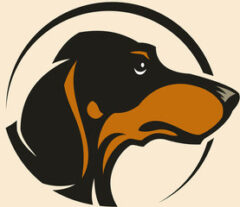
What Kind Of Food Should You Feed A Dachshund

Introduction
Are you a proud owner of a Dachshund? Then you already understand the importance of providing your furry friend with the right kind of food. But with so many options available, it can be confusing to determine what’s best for them. Don’t worry, in this article, we will guide you on what kind of food you should feed your Dachshund to keep them healthy and happy.
Dachshunds have specific dietary needs due to their unique body shape and size. They are prone to obesity and are susceptible to certain health issues. Therefore, it’s essential to choose a diet that suits their requirements. Whether you prefer commercial dog food or a homemade diet, we will explore the pros and cons of each option, so you can make an informed decision.
Furthermore, we will delve into the key nutrients your Dachshund needs, such as high-quality proteins, healthy fats, and the right balance of carbohydrates. We will also discuss portion control and feeding schedules, as these factors play a vital role in maintaining their overall well-being.
Stay tuned to ensure your Dachshund receives the nourishment they need for a long, happy, and healthy life.
Understanding the dietary needs of a Dachshund
Dachshunds have unique dietary requirements that differ from other dog breeds. Due to their long bodies and short legs, they are prone to obesity and back problems. Therefore, it’s crucial to choose a diet that helps them maintain a healthy weight and supports their overall well-being.
To meet the dietary needs of your Dachshund, you should focus on providing them with high-quality proteins, healthy fats, and the right balance of carbohydrates. Proteins are essential for muscle development and repair, while fats provide energy and support their skin and coat health. Carbohydrates should be limited and come from whole grains and vegetables to ensure a steady release of energy.
Additionally, Dachshunds need a diet rich in vitamins and minerals, including calcium for their bone health and antioxidants for their immune system. It’s also important to consider their age, activity level, and any specific health conditions they may have when determining their dietary needs.
Recommended food options for Dachshunds
When it comes to choosing the right food for your Dachshund, you have two main options: commercial dog food or a homemade diet. Both have their advantages and disadvantages, so let’s explore each option in detail.
Commercial dog food
Commercial dog food is convenient and readily available. It comes in various forms, including dry kibble, wet canned food, and semi-moist options. Look for high-quality dog food brands that specifically cater to Dachshunds or small-breed dogs.
These brands often offer formulas that are tailored to the unique needs of Dachshunds, such as reduced-calorie options to prevent obesity and formulas with joint support ingredients to address their back problems. Read the labels carefully and choose products that contain real meat as the first ingredient, without any artificial additives or fillers.
Homemade food
If you prefer to have full control over your Dachshund’s diet, a homemade diet may be the right choice for you. It allows you to select the ingredients and ensure that your dog is getting the nutrients they need. However, it’s important to consult with a veterinarian or a canine nutritionist to create a balanced and complete homemade diet that meets your Dachshund’s specific requirements.
Homemade diets typically consist of lean meats, such as chicken or turkey, mixed with vegetables and whole grains. It’s crucial to provide the right balance of proteins, fats, and carbohydrates and incorporate necessary supplements to fill any nutritional gaps. Keep in mind that homemade diets can be time-consuming to prepare, and it’s essential to follow proper food safety practices to prevent contamination.
High-quality dog food brands for Dachshunds
When choosing commercial dog food for your Dachshund, it’s important to opt for high-quality brands that prioritize the nutritional needs of small-breed dogs. Here are some reputable dog food brands that offer suitable options for Dachshunds:
- Royal Canin Dachshund Adult: This brand offers a breed-specific formula that addresses the unique needs of Dachshunds, including their bone and joint health. It contains a precise blend of nutrients and antioxidants to support their overall well-being.
- Hill’s Science Diet Small Paws: Hill’s Science Diet is a well-known brand that offers a range of options for small-breed dogs. Their Small Paws formula provides balanced nutrition with high-quality ingredients and is tailored to support the specific needs of Dachshunds.
- Wellness CORE Grain-Free Small Breed: If you prefer grain-free options, Wellness CORE offers a small breed formula that is free from grains and artificial additives. It contains real meat as the first ingredient and provides the necessary nutrients for your Dachshund’s optimal health.
Remember to read the labels and choose products that align with your Dachshund’s specific requirements, such as age, weight, and any existing health conditions.
The importance of portion control for Dachshunds
Portion control is crucial when feeding a Dachshund. Due to their predisposition to obesity, it’s essential to ensure they are not overfed. Dachshunds have a tendency to beg for food and may act hungry even when they have had enough. Therefore, it’s important to establish a feeding schedule and stick to it.
Consult with your veterinarian to determine the appropriate portion size for your Dachshund based on their age, weight, activity level, and overall health. It’s important to measure their food and avoid free-feeding, as it can lead to weight gain. Split their daily food allowance into multiple small meals to prevent bloating and digestive issues.
Regularly monitor your Dachshund’s weight and adjust their portion size as needed. It’s better to be proactive and maintain a healthy weight rather than trying to address obesity-related issues later on.
Homemade food options for Dachshunds
If you choose to prepare a homemade diet for your Dachshund, it’s important to ensure it’s nutritionally balanced and provides all the necessary nutrients. Here are some homemade food options that can be incorporated into your Dachshund’s diet:
- Lean meats: Chicken, turkey, and lean beef are excellent sources of high-quality protein for your Dachshund. Remove any excess fat and cook the meat thoroughly to eliminate the risk of bacterial contamination.
- Vegetables: Include a variety of vegetables in your Dachshund’s diet, such as carrots, green beans, and peas. These provide essential vitamins and minerals, as well as dietary fiber.
- Whole grains: Whole grains like brown rice and quinoa can be included in moderation to provide a source of carbohydrates and fiber. Avoid grains that are high in gluten, as Dachshunds may be sensitive to it.
- Supplements: To ensure your Dachshund is receiving all the necessary nutrients, consider adding supplements such as fish oil for healthy fats and joint support, and a canine multivitamin to fill in any nutritional gaps.
Remember to introduce new foods gradually and monitor your Dachshund for any adverse reactions. If you’re unsure about creating a homemade diet, consult with a veterinarian or a canine nutritionist to ensure it meets your Dachshund’s specific needs.
Foods to avoid feeding Dachshunds
While it’s important to provide your Dachshund with a balanced diet, there are certain foods that should be avoided as they can be toxic or harmful to their health. Here are some foods that should never be fed to Dachshunds:
- Chocolate: Chocolate contains theobromine, which is toxic to dogs and can cause symptoms ranging from vomiting and diarrhea to more severe complications.
- Grapes and raisins: Grapes and raisins can cause kidney failure in dogs, so it’s best to avoid feeding them to your Dachshund.
- Onions and garlic: Onions and garlic contain compounds that can damage a dog’s red blood cells, leading to anemia. Avoid feeding any foods that contain these ingredients.
- Xylitol: Xylitol is a sugar substitute commonly found in sugar-free gum and some peanut butter brands. It can cause a rapid drop in blood sugar levels and liver failure in dogs.
Always double-check the ingredients of any food before feeding it to your Dachshund, and if in doubt, consult with your veterinarian.
Feeding schedule and meal frequency for Dachshunds
Establishing a regular feeding schedule and meal frequency is crucial for maintaining your Dachshund’s overall health and preventing obesity. Here are some guidelines to follow:
- Puppies: Puppies require more frequent feeding compared to adult Dachshunds. Feed them three to four times a day until they are about six months old. Gradually decrease the number of meals as they age.
- Adult Dachshunds: Once your Dachshund reaches adulthood, you can switch to feeding them twice a day. Split their daily food allowance into two meals, ideally 12 hours apart.
- Senior Dachshunds: As Dachshunds age, their metabolism may slow down, and they may require fewer calories. Consult with your veterinarian to determine the appropriate feeding schedule and adjust their portion size accordingly.
Remember to monitor your Dachshund’s weight and body condition regularly. If you notice any signs of weight gain or loss, consult with your veterinarian to make necessary adjustments to their feeding schedule.
Common feeding issues and how to address them
Feeding issues can arise with Dachshunds, just like any other dog breed. Here are some common feeding issues and how to address them:
- Picky eating: Some Dachshunds can be picky eaters, making it challenging to find a food they enjoy. If your Dachshund is a picky eater, try offering different textures and flavors to find what they prefer. You can also mix in some high-quality wet food or toppers to enhance the taste.
- Food allergies and sensitivities: Dachshunds, like other breeds, can develop food allergies or sensitivities. If you notice signs of allergies, such as excessive itching, gastrointestinal issues, or skin problems, consult with your veterinarian to determine the potential allergens and switch to a suitable hypoallergenic diet.
- Overeating and begging: Dachshunds are notorious for their begging behavior and may act hungry even when they have had enough food. It’s important to establish clear boundaries and resist the urge to give in to their begging. Stick to the recommended portion sizes and avoid sharing human food with them, as it can lead to weight gain and disrupt their balanced diet.
If you’re encountering any specific feeding issues with your Dachshund, consult with your veterinarian for personalized advice and guidance.
Conclusion and final tips for feeding a Dachshund
Feeding your Dachshund the right kind of food is crucial for their overall health and well-being. Understanding their unique dietary needs, choosing the right commercial dog food or preparing a homemade diet, practicing portion control, and following a regular feeding schedule are all essential aspects of providing them with the nourishment they require.
Remember to consult with your veterinarian to determine the best feeding approach for your Dachshund based on their age, weight, activity level, and any existing health conditions. Regularly monitor their weight and body condition, and make adjustments as needed.
By prioritizing their nutritional needs and providing them with a balanced and healthy diet, you can ensure your Dachshund lives a long, happy, and healthy life. So, go ahead and give your furry friend the food they deserve!
Sources: – https://www.akc.org/dog-breeds/dachshund/ – https://www.petmd.com/dog/nutrition/evr_dg_dachshund_diet – https://www.akc.org/expert-advice/nutrition/dog-nutrition-tips/ – https://www.hillspet.com/dog-care/nutrition-feeding/foods-to-avoid-feeding-dog – https://www.akc.org/expert-advice/nutrition/
Tags:
